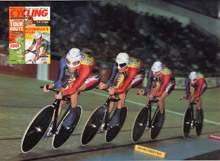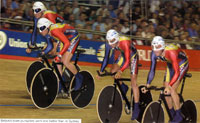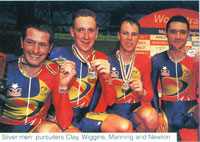Pursuit team so close to gold
 A
SILVER medal in the team pursuit confirmed Britain's place as one the
strongest nations in the world, but the tangible disappointment of not
whaling the gold deflated the team's initial celebrations as they conceded
to the Germans.
A
SILVER medal in the team pursuit confirmed Britain's place as one the
strongest nations in the world, but the tangible disappointment of not
whaling the gold deflated the team's initial celebrations as they conceded
to the Germans.
EVEN without the mighty Roberto Bartko to anchor them the German pursuit team added the world championship to their Olympic title, denying the British squad a gold medal.
For both finalists the pressure was immense; neither team had finished with all four riders in the second round, and when the French quartet fell to pieces in the semi-finals it was a timely reminder that the smallest error could cost dear.
 In
the final both teams rode well, but the Britons were unable to match the
Germans" power in the second half of the race. With a kilometre to
go they were 1.6 seconds clear, and although Sebastian Siedler was dropped
the gap was too much to be bridged. Britain moved one step up on the podium
from bronze in Sydney to silver in
In
the final both teams rode well, but the Britons were unable to match the
Germans" power in the second half of the race. With a kilometre to
go they were 1.6 seconds clear, and although Sebastian Siedler was dropped
the gap was too much to be bridged. Britain moved one step up on the podium
from bronze in Sydney to silver in
Manchester, and for the Germans - world record holders, Olympic champions, world champions for the second year running - the only question left was what they do next.
"I'm really pleased, but it's disappointing to get within reaching distance of a rainbow jersey.. Those rings are on your jersey for ever," said Chris Newton after the final.
 Qualifying
fastest in a comfortable 4-06 they rode against the Czech Republic in
the quarterfinals, catching and passing them to finish in 4-02.115, despite
losing Paul Manning with five laps to go. A momentary hesitation as he
swung down the banking left him off the back as Bradley Wiggins took his
turn at the front, and with the noise levels reaching maximum volume the
leading rider did not hear Manning call out. Chris Newton started to slip
away from Jon Clay's wheel, but with a big effort regained contact and
they completed the 4,000 metres with three riders.
Qualifying
fastest in a comfortable 4-06 they rode against the Czech Republic in
the quarterfinals, catching and passing them to finish in 4-02.115, despite
losing Paul Manning with five laps to go. A momentary hesitation as he
swung down the banking left him off the back as Bradley Wiggins took his
turn at the front, and with the noise levels reaching maximum volume the
leading rider did not hear Manning call out. Chris Newton started to slip
away from Jon Clay's wheel, but with a big effort regained contact and
they completed the 4,000 metres with three riders.
With the Germans also dropping a rider in the quarter-finals, the Britons were not unduly concerned with their ride. "In that situation we should have had a three-man shout," said Newton, "but with the noise from the crowd we couldn't hear anything. I think Paul just did a really hard turn to get us going, it's not a problem. It's been happening to other teams too, they've all been missing turns."
Wiggins reiterated the team's confidence. "We'll get it together. It was a technical thing, not a physical one," he said.
Such was the mood in the British camp that the team were looking forward to riding against France in the semis. "It's the third time we've met this year, and we've beaten them twice. Hopefully we can stay smooth and save it for the final," said Manning. Both they and the Germans had ridden a full three seconds faster than the other two semi-finalists, and the riders sensed that a world title may be within their grasp.
"I'm looking forward to it," said Wiggins, "I don't think the Germans can go much faster. It'll be close if we reach the final."
Both semi-finals went to form. Britain delighted the crowd by catching the French, and the Germans defeated a Russian quartet who were obviously saving themselves for the bronze medal ride.
The 1999 runners-up buckled less than two minutes into the race, first losing Damien Pommerau and then almost letting Cyril Bos disappear off the front as he tried too hard to compensate for the time they had already lost. The roar from the crowd told the Britons that something was happening on the other side of the track, and a circumspect look at the big screen as they passed confirmed that France's error had put them in an unassailable position.
As defending champions, world record holders and Olympic gold medallists, Wiggins said that the Germans had everything to prove. "The pressure's all on them. We've had no reputation in this discipline for the last 10, 15 years. They've got to worry about us more than we have about them."
Likewise the Germans felt that the home advantage was enough to make the British the bestplaced team. "They were the favourites in our eyes. As the home nation we saw them as a big danger," admitted Jens Lehmann afterwards.
Bryan Steel had ridden in the qualifying round and the semifinal, with Jon Clay competing in the quarter-final and then the final. While Steel relaxed at one of the bars in the velodrome, the other four riders prepared for the last ride of the competition.
For the first kilometre just half a second separated the two teams, but with each lap the Germans eked out their advantage, until with 1,000 metres to go they were 1.5 seconds ahead. Sebastian Siedler dropped off, but the race was won. The Britons had to settle for silver. For the team, it was proof that their Olympic medal was the start of a new era in British pursuiting, establishing them as a dominant force and much more than an outside contender.
"We knew that it was going to be close," Manning said. "We've split up the medallists from last year. Now other teams look at us as someone to beat, not just making up numbers."
The oldest member of the team, Jon Clay, decided before the event that the World's would be his final international competition. "Personally I couldn't be happier to finish a cycling career like that," said the 37 year old after collecting his silver medal in front of his wife and children.
His moment on the podium was even sweeter because he missed out on the ceremony in Sydney. "As I was walking up I had a little bit of a tear in my eye, but it happens so quickly. You're on the podium, then you're in the press conference and then it's finished. You just wish it could last a week."
Qualifiers
1. Great Britain (Paul Manning, Christopher Newton, Bryan Steel
and Bradley Wiggins) 4-06.984
2. France (Cyril Bos, Philippe Gaumont, Jerome Neuville, Damien Pommereau)
4-07.189
3. Germany (Sebastian Sielder, Daniel Becke, Guido Fulst, Jens Lehmann)
4-07.483
4. Russia (Edouard Gritsoun, Alexei Markov, Alexander Serov, Denis Smyslov)
5. Holland (John Den Braber, Jens Nouris, Peter Schep, Wilco Zuijderwijk)
4-15.604
6. Spain (Mecho Francisco Carrion, Roure Sergio Escobar, Cristobal Forcadell,
Tarres Carlos Torrent) 4-16.157
7. Poland (Robert Karsnicki, Szymon Kurdynowsky, Jaroslaw Rebiewski, Pawel
Zugal) 416.997
8. Czech Republic (Martin Blaha, Libor Hlavac, Milan Kadlec, Josef Kankovsky)
4-18.425
9. Italy (Sauro Bembo, Maurizio Biondo, Luca Capuzzo, David Garbelli)
4-23,577
10. Mexico (Miguel Alcantara, Juan Luis Contreras, Mario Alberto Sanchez,
Sotelo Jose Sanchez) 4-27.577
Quarter-finals
Russia ct Holland 408,102
Germany ct Spain 4-02.059
France bt Poland 4-05.634
Great Britain ct Czech Republic 4-02.115
Semi-finals
Great Britain ct France
Germany bt Russia 4-07.386.
Final 3/4.
France bt Russia 4-06.288
Final 1/2
Germany bt Great Britain 4-01.322.